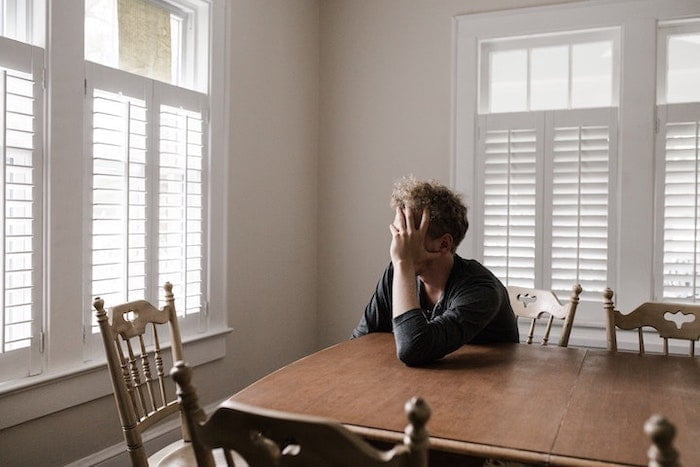Quick links for alcohol and schizophrenia
- What is schizophrenia?
- What causes schizophrenia?
- Schizophrenia and addiction
- Symptoms of schizophrenia
- Getting help for schizophrenia and alcohol use disorder
- References for alcohol addiction and schizophrenia
People suffering from schizophrenia are six times more likely [1] to suffer from a substance use disorder than those without schizophrenia.
Those abusing alcohol are likely to do so as a form of self-medication in the first instance, however, this can quickly spiral into an addiction.
What is schizophrenia?

Patient speaking with a therapist about alcohol addiction and schizophrenia
Schizophrenia is a serious and long-term mental health condition that causes a person to see things that are not there and hear voices that do not exist.
It can also cause paranoia and confusion.
Paranoia and schizophrenia are not the same thing, however, and someone with schizophrenia who develops intense feelings of paranoia is known as a paranoid schizophrenic.
What causes schizophrenia?

Two people having a serious conversation about alcohol addiction and schizophrenia
There isn’t one singular cause of schizophrenia and researchers believe that a number of factors can trigger it.
These factors differ from person to person, but some of the main factors include:
1. Traumatic events triggering schizophrenia
Significantly stressful life events such as physical or sexual abuse can sometimes trigger schizophrenia in people. Other events that may trigger it include grief, relationship breakdowns, job loss, financial difficulties or intense loneliness or isolation.
2. Drug and alcohol abuse and their impact on schizophrenia
Recreational drug and alcohol use is linked with schizophrenia, however, researchers are unsure whether drugs and alcohol actually cause schizophrenia and instead believe that people with schizophrenia are more likely to use drugs or alcohol.
Heavy cannabis use is linked to relapse in patients with schizophrenia, so it is believed that people suffering from schizophrenia tend to turn to recreational drugs and alcohol to self-medicate. [2]
This causes a vicious circle of symptoms, as drugs and alcohol may worsen symptoms of schizophrenia and could also cause the medication to be less effective.

Man holding his head suffering from schizophrenia
3. Genetic inheritance and schizophrenia
Some studies have shown that you are slightly more at risk of developing schizophrenia if you come from a family in which other members suffer from schizophrenia.
While the genetic risk may be minimal, the environmental and emotional factors of growing up with a schizophrenic parent can make you more at risk. [3]
Other factors are viruses in-utero. For example, a baby whose mother contracts the flu during pregnancy has a heightened risk of developing schizophrenia in later life. [4]
4. Altered brain chemistry and schizophrenia
Imbalances in brain chemistry can trigger mental health disorders such as schizophrenia.
Scientists believe that people with schizophrenia have an imbalance of dopamine, glutamine and serotonin which can affect how the brain sends and receives messages. [5]
Schizophrenia and addiction

Two people talking about schizophrenia and alcohol abuse
Addiction is often a co-occurring issue alongside schizophrenia.
Many times, a person suffering from schizophrenia will abuse drugs or alcohol to alleviate feelings of depression or anxiety.
This can be detrimental as although alcohol and drugs themselves do not cause schizophrenia, abusing such substances can trigger schizophrenia or cause the symptoms of schizophrenia to become worse.
Someone suffering from schizophrenia might enjoy the release afforded to them by excessive drinking as alcohol acts as a depressant of the central nervous system. This gives the sufferer a break from the overwhelming feelings they may have when they are not drinking.
Unfortunately, this can lead to a spiral effect in which the person uses alcohol to suppress the symptoms instead of seeking professional help.
As the symptoms of alcohol addiction amd schizophrenia can be quite similar, it is often difficult for a person to be given a dual diagnosis of AUD (alcohol use disorder) and schizophrenia as many healthcare providers will focus on one or the other when attempting to make a diagnosis.
Symptoms of schizophrenia

Man holding his head and speaking with a therapist about schizophrenia and alcohol abuse
Schizophrenia makes it difficult for a person to function normally in everyday life.
Symptoms can vary from person to person, but some of the most common symptoms of schizophrenia include: [6]
- Delusional beliefs: Having delusional beliefs means that a person believes things are real when they are not. This kind of thinking can range from being quite harmless, for example, someone might believe that they have psychic abilities, to being dangerous, for example, someone might believe that they are being threatened or harassed by another person.
- Hallucinations: Hallucinations can be visual, auditory or based on touch. Someone with schizophrenia might believe that they can hear voices that do not exist or see things that are not actually there.
- Nonsensical speech: A person with schizophrenia generally has a difficult time organising their thoughts and therefore they have trouble structuring coherent sentences. They might change the subject midway through a sentence, say things that make no sense or blurt out random words, phrases or noises for no apparent reason.
- Strange behaviour: Going between a catatonic state to excessive talking and moving can be a sign of schizophrenia. They might sit or stand in an uncomfortable or odd posture for no reason, refuse to respond to a person speaking to them or become suddenly unable to stop moving or speaking.

People holding hands and speaking about schizophrenia and alcohol addiction
Other strange behaviours to look out for include:
- A lack of interest in things they once enjoyed
- Alack of motivation to get involved in activities
- Withdrawing from their social group
- Poor sleep patterns
- Poor personal hygiene
- Missing work or school
- Self-harm
- Aggression
If you feel that someone you know may be suffering from alcohol use disorder and schizophrenia, it is important that they get help as soon as possible.
This will reduce the probability that they will harm themselves or others, and the longer these issues go untreated, the more difficult and dangerous they are to treat.
Getting help for schizophrenia and alcohol use disorder

Patient and therapist discussing a treatment plan for schizophrenia and alcohol abuse
Withdrawing from alcohol can be a dangerous and life-threatening experience for people and adding schizophrenia as a co-occurring condition only makes it more difficult.
A common withdrawal symptom from alcohol is Delirium Tremens (DT’s) which causes delusional thinking and hallucinations.
These symptoms in someone who is already battling schizophrenia can cause them to become a danger to themselves or others.
A stay at a residential treatment facility is the best way for someone with schizophrenia and alcohol use disorder to overcome their addiction and get their symptoms under control.
In a residential facility, the patient will have 24-hour access to medical professionals and get the support and medication they need as they go through the withdrawal symptoms. They can also get the medication needed to control their schizophrenic tendencies.
Talking therapy and holistic practices such as art therapy are also used in residential facilities to aid in your recovery.
After the residential treatment has been completed, continued medication and therapy during aftercare is recommended to prevent a relapse.
Cognitive Behavioural Therapy (CBT) and psychotherapy are useful in changing the way you approach certain situations and have proven to be beneficial in treating schizophrenia. [7]
References for alcohol addiction and schizophrenia
- https://www.ncbi.nlm.nih.gov/pmc/articles/PMC2084476/
- https://www.ncbi.nlm.nih.gov/pmc/articles/PMC3181760/
- https://www.ncbi.nlm.nih.gov/pmc/articles/PMC3433970/
- https://www.ncbi.nlm.nih.gov/pmc/articles/PMC2441883/
- https://www.ncbi.nlm.nih.gov/pmc/articles/PMC3181617/
- https://www.nhs.uk/mental-health/conditions/schizophrenia/overview/
- https://www.ncbi.nlm.nih.gov/pmc/articles/PMC2811142/






